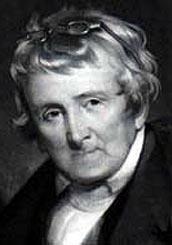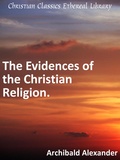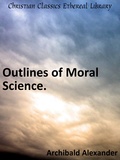Archibald Alexander
American Presbyterian minister and educator
Biography
Archibald Alexander was born in Rockbridge County, Virginia, 17 April 1772, and died in Princeton, New Jersey, 22 October 1851. His grandfather, of Scottish descent, came from Ireland to Pennsylvania in 1736, and after a residence of two years removed to Virginia. William, father of Archibald, was a farmer and trader. At the age of ten Archibald was sent to the academy of Rev.William Graham at Timber Ridge meetinghouse (since developed into Washington and Lee University), at Lexington. At the age of seventeen he became a tutor in the family of General John Posey, of The Wilderness, twelve miles west of Fredericksburg, but after a few months resumed his studies with his former teacher. At this time a remarkable movement, still spoken of as "the great revival," influenced his mind and he turned his attention to the study of divinity. He was licensed to preach 1 October 1791, ordained by the presbytery of Hanover 9 June 1794, and for seven years was an itinerant pastor in Charlotte and Prince Edward cos.
In 1796 he became president of Hampden Sydney College, Virginia, but in 1801 resigned, and visited New York and New England. During his tour he went to see the Rev. Dr. Waddel, the celebrated blind preacher mentioned by Wirt in his "British Spy." The result of this visit was his marriage to Dr. Waddel's daughter Janetta. Immediately after he resumed his presidency, but, owing to insubordination among the students, retired, and became in 1807 pastor of the Pine Street Presbyterian Church in Philadelphia. The degree of D. D. was conferred on him by the College of New Jersey in 1810, and in the same year he was elected president of Union College in Georgia, a fact which remained unknown even to his family until after his death.
On the organization of the theological seminary at Princeton in 1812 Dr. Alexander was unanimously chosen as the leading professor. As the number of students increased and other professors were added to the faculty, he was enabled to direct his attention more particularly to the department of pastoral and polemic theology, in promoting which, with the general interests of the institution, he labored with zeal and success till his death, a period of nearly forty years. His powers both for pulpit oratory and polemic disquisition were extraordinary. He was always busy, and from 1829 to 1850 scarcely a number of the Princeton Review appeared without an article from his pen. His style was idiomatic and forcible. With the exception of occasional sermons and contributions to periodicals, he published nothing until he had entered his fifty-second year. His first work was Outlines of the Evidences of Christianity (1823), which has been translated into various foreign languages and is used as a textbook in Colleges. It was reprinted in London in 1828, and again with a new edition in 1833, accompanied with introductory notes by Rev. John Morison, D.D. This was followed by a Treatise on the Canon of the Old and New Testaments (1826); Lives of the Patriarchs (1835) ; Essays on Religious Experiences (1840) ; History of African Colonization (1846); History of the Log College (1846); History of the Israelitish Nation (1852), and other works.
He also contributed largely to periodicals. He left several works in manuscript, of which the Outlines of Moral Science (1852) was pronounced by the Westminster Review to be a "calm, clear stream of abstract reasoning, flowing from a thoughtful, well-instructed mind, without any parade of logic, but with an intuitive simplicity and directness which gives an almost axiomatic force." Other posthumous works were Duties and Consolations of the Christian ; Patriarchal Theology ; History of the Presbyterian Church in Virginia ; Biographical Sketches of Distinguished American Clergymen and Alumni of the College of New Jersey; and Church Polity and Discipline.



